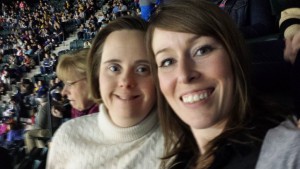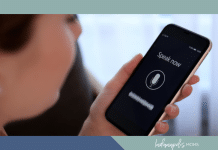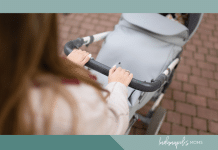We are all alike, we are all different. As a preschool teacher and currently an in-home childcare provider I have always held this mentality. There are things about each one of us that make us unique and things about us that we have in common with everyone else on the planet. Growing up I was taught that no one, no matter their differences, were any different than me. My parents encouraged me to always follow the golden rule; “do unto others as you would have them do unto you”. Whether you are of a religious affiliation or not, it is hard to disagree that this one saying is something we all want our children to live by. We all want for our children to be kind and caring individuals and we teach them from an early age to be considerate of others. Having this mentality of kindness and consideration is especially important when our children meet someone who has a disability, but navigating the topic can be a little intimidating. Unless you or your child have personally had a person with a disability in your life it can be difficult to know how to approach a conversation with your child. When the time for a discussion does arise, what is the best way to discuss this topic with them?
Perhaps it is because I volunteer with Best Buddies Indiana, have worked with special needs children my entire career, and am currently pursuing my BA in Special Education, I tend to gravitate toward the many heartwarming stories of children with disabilities and their accomplishments in life. I thrive on seeing success stories and it makes me want to be a bigger part of the community that teaches children with disabilities to meet their goals in life and in learning. All too often though, I see stories of children who are bullied, intimidated, ignored, and ridiculed for things they cannot help. While it takes a great deal of time to educate oneself about disabilities, it doesn’t take long to learn kindness and acceptance. This is where we do our children well to teach them early the value of acceptance and the true value of friendship by highlighting all of a person’s amazing qualities instead of their disabilities.
 As I mentioned before, I volunteer with Best Buddies Indiana. This program matches individuals with an intellectual or developmental disability with a person who has no disability to create one-to-one friendships as well as a multitude of other programs including job placement and leadership opportunities. I have a buddy match myself with a wonderful woman, Katie. She is one of the kindest people I have ever met. She is always quick to ask you how you are doing, how your week has been, and how everyone else in your family is. She loves to laugh at a good movie and she picks most of her favorite restaurants based on their dessert menu. She loves kids, she works at Community Hospital North in Indianapolis, and once a month volunteers with a program at St. Vincent Hospital. She is quite a celebrity in the Best Buddies world and has traveled the country speaking on behalf of the program, sometimes in front of as many as 10,000 people. She has worked events with Maria Kennedy Shriver, Barbara Walters, and her all-time favorite actress, Linda Gray. My favorite story that she has ever told was the event where Oprah Winfrey was supposed to speak and for whatever reason couldn’t be there at the extreme last minute. With five minutes to go onstage in front of a crowd of thousands, Katie was asked and she accepted. How many people can say they have filled in for Oprah Winfrey for heaven’s sake?! This is the Katie that I know and love as my own sister. This is the Katie that I want the world to know. To hear her whole story is one that does not have such a bright beginning, though. You see, Katie has Down’s Syndrome and she talks about growing up without friends, walking the hallways alone at school, and eating lunch by herself. She was different and no one was encouraged to look at what she could do because they only chose to see what she couldn’t do. I often wonder what her life would have been like if just a few parents had taken the time to highlight the importance of kindness, acceptance, and friendship with their children. If you ask her now, she will tell you that she wouldn’t be who she is today without the life she had. She is proud of who she is and she loves herself, but it shouldn’t have had to be that way for her early on.
As I mentioned before, I volunteer with Best Buddies Indiana. This program matches individuals with an intellectual or developmental disability with a person who has no disability to create one-to-one friendships as well as a multitude of other programs including job placement and leadership opportunities. I have a buddy match myself with a wonderful woman, Katie. She is one of the kindest people I have ever met. She is always quick to ask you how you are doing, how your week has been, and how everyone else in your family is. She loves to laugh at a good movie and she picks most of her favorite restaurants based on their dessert menu. She loves kids, she works at Community Hospital North in Indianapolis, and once a month volunteers with a program at St. Vincent Hospital. She is quite a celebrity in the Best Buddies world and has traveled the country speaking on behalf of the program, sometimes in front of as many as 10,000 people. She has worked events with Maria Kennedy Shriver, Barbara Walters, and her all-time favorite actress, Linda Gray. My favorite story that she has ever told was the event where Oprah Winfrey was supposed to speak and for whatever reason couldn’t be there at the extreme last minute. With five minutes to go onstage in front of a crowd of thousands, Katie was asked and she accepted. How many people can say they have filled in for Oprah Winfrey for heaven’s sake?! This is the Katie that I know and love as my own sister. This is the Katie that I want the world to know. To hear her whole story is one that does not have such a bright beginning, though. You see, Katie has Down’s Syndrome and she talks about growing up without friends, walking the hallways alone at school, and eating lunch by herself. She was different and no one was encouraged to look at what she could do because they only chose to see what she couldn’t do. I often wonder what her life would have been like if just a few parents had taken the time to highlight the importance of kindness, acceptance, and friendship with their children. If you ask her now, she will tell you that she wouldn’t be who she is today without the life she had. She is proud of who she is and she loves herself, but it shouldn’t have had to be that way for her early on.
So, what about others, who may be in Katie’s former shoes? The kids who, just because they look or act differently, suffer the same as Katie did? Eating alone, having no one to hang out with, isolated because of a difference. How can you as a parent help a child with a disability become included in your child’s life and how do you approach the subject? Think about the children in your child’s school or the kids in your own neighborhood. Are there any children who have a disability that could benefit from a peer friendship? If there are, perhaps find a way to discuss with your older children (ages 7 and up is what I would consider older) a way to include them in activities around school or the neighborhood. Plan to get other parent’s involved too. Be proactive and encouraging! Perhaps find a way to communicate with the parent of the child with the disability. After all, they may need a friend too since they may be in a state of isolation themselves from having a child with a disability. By trying to build a friendship yourself, your child may quickly gravitate towards a friendship with the child on their own as your families grow closer. If your child is in middle or high school, Best Buddies Indiana has chapters within most Indianapolis-area schools and across the state of Indiana. Encourage your child to reach out within this amazing volunteer program that focuses on building lasting friendships. It may take you as the parent to reach out and open up dialogue about the subject of disabilities with your older children so that they may be encouraged to see for themselves the good in everyone and to look past the disability.
If your child is younger, my best advice is to do the opposite. Leave the subject alone and only discuss it if your child asks you about it. Young children have one of the greatest abilities in the world in that they don’t focus on anything other than what is in front of them. Their focus isn’t on the fact that you wear glasses or that you are in a wheelchair. Their focus isn’t on whether or not you have almond eyes or can’t stand the feel of certain textures. Young children simply care about being played with and anyone who will play with them is a friend. It is truly wonderful how simple it is. I take care of a little boy with Down’s Syndrome and to his sister, cousins, neighbors, and my son, he’s just Leo. The boy who loves to laugh, chase you around, play “monster”, hide-and-go-seek, and ball. He loves playing band with instruments, having dance parties, and pretend picnics. He is just Leo because that’s how we, adults, treat him–like everyone else–and his peers see this. Yes, he has a disability but that doesn’t change how he is viewed by adults or his friends. He can keep up with the best of them in his own way and that is all his friends care about. We would be in the wrong to point out his differences and change how his friends see him now because they only see his abilities. The time will come when they will ask questions, and with great love and care those questions will be answered. Until then there is no reason or need. Just let kids be kids and let the genuine friendships grow.
The fact of the matter is this: it is up to us as parents to know when to speak and when to stay silent. We will have to have many “talks” with our children throughout their lives. Discussing people and differences is just another one of those talks. There will be a time and place for this conversation to happen, but until then it is our duty to help our child look for the abilities in others instead of the disabilities. With tactfulness, love, and a proactive approach we can do our part now to leave this world a little better for our children through teaching them one of the greatest tools for success and change: kindess.
For more information on Best Buddies Indiana please go to www.bestbuddiesindiana.org








